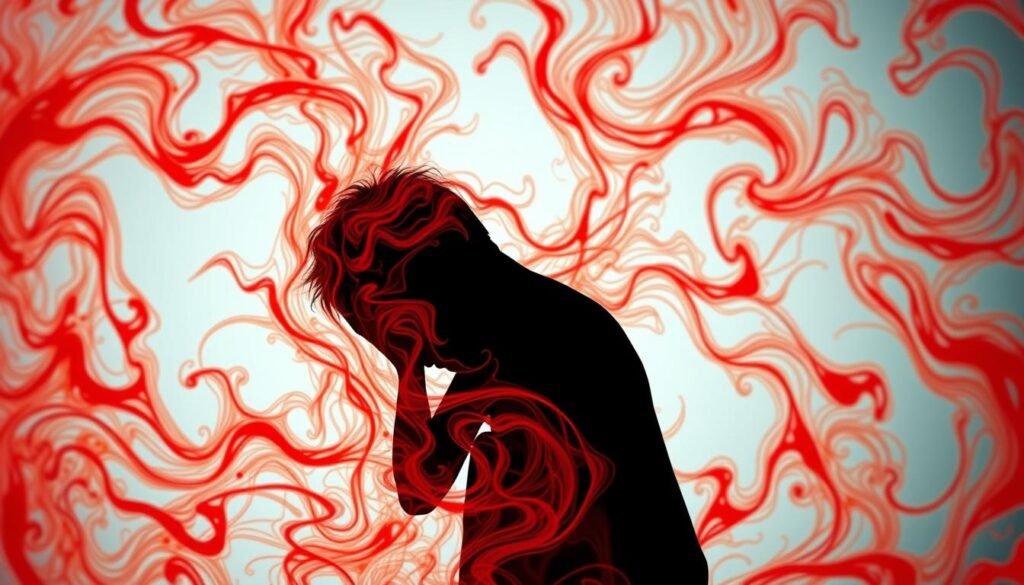Did you know over 90% of people with rheumatoid arthritis (RA) feel very tired because of it? They say it’s almost as bad as the pain. This fact shows how important it is to talk about and deal with fatigue in RA.
For those dealing with rheumatoid arthritis, beating fatigue is key to feeling better. Simple steps can really change how you feel every day. By looking into scientific methods, you can find energy again and beat RA’s tiring effects.
In this article, we’ll explore why RA makes you tired, how to handle it, and why it’s crucial to know about this symptom. You’ll learn how some changes in your life can make you more energetic and healthier.
Key Takeaways
- Over 90% of RA patients experience fatigue as a prominent symptom.
- Chronic inflammation is a primary contributor to fatigue in RA patients.
- Exercise plays a vital role in reducing fatigue and improving joint health.
- A balanced diet can significantly aid in rheumatoid arthritis fatigue management.
- Utilizing assistive devices can help conserve energy during daily activities.
- Quality sleep is crucial for maintaining energy levels.
- Support systems and community involvement can improve overall well-being.
Understanding Rheumatoid Arthritis Fatigue
Understanding RA fatigue is crucial for those with this condition. This fatigue is more than just feeling tired. It can be a deep, overwhelming exhaustion. It makes daily activities hard for many with rheumatoid arthritis.
Statistics show a tough reality: about 1 in 6 people with rheumatoid arthritis suffer from severe fatigue. Over half of those with the disease score their fatigue five or above. This shows a big drop in life quality. Pain adds to this problem, as over 75% report pain that adds to their tiredness within five years.
Several factors increase fatigue in RA patients. Women often feel more tired than men. Those with active disease, multiple health issues, obesity, and mental conditions like anxiety or depression might feel more tired. A study found that extroverts with the disease may feel more tired, hinting personality might affect how we see fatigue.
Research suggests fatigue has a stronger link with chronic pain and how patients view their condition than with disease activity. Losing muscle mass can make you tired. Other health problems like anemia or hypothyroidism also drain your energy. Plus, RA treatments like methotrexate can make you tired.
Lifestyle is key for managing energy for RA sufferers. Bad eating habits, not enough water, poor sleep, stress, not moving much, and being overweight can all make fatigue worse. Tackling these issues is vital for better energy and health in RA patients.
Why Does RA Cause Fatigue?
Fatigue is a major issue for people with rheumatoid arthritis (RA). About 70% of patients report feeling very tired. This can make it hard to stay active and affects mood and daily life. Understanding the causes of RA fatigue is key.

Chronic inflammation is a big cause of fatigue in RA. It leads to pain and a higher level of tiredness. There’s a strong link between inflammation and fatigue in RA patients.
Also, RA often causes sleep problems because of pain. Bad sleep makes the fatigue worse, leading to a cycle of tiredness and more stress. This cycle makes daily life even harder for those with RA.
Mental health also plays a role in RA fatigue. Poor mental well-being increases the risk of feeling tired. Managing stress and emotions can help fight RA fatigue triggers. This improves energy.
To deal with these issues, a mix of treatments is often best. Changes in lifestyle, exercises, and medications can help. Activities like yoga or swimming are good for both body and mind. Talking to doctors can help find the best treatments for causes of RA fatigue. For deeper insights into managing RA fatigue, check out WebMD.
Knowing what causes inflammation and fatigue helps RA patients find ways to lessen tiredness. This improves their life quality.
Managing Fatigue with Rheumatoid Arthritis
Managing RA fatigue means understanding its symptoms and what causes them. Knowing about RA symptoms, especially fatigue, is key in finding ways to deal with it. Learning how inflammation is linked to fatigue allows people to fight off tiredness and lead better lives.
Recognizing Symptoms of RA Fatigue
RA fatigue is different from just feeling tired because of doing a lot. It involves feeling worn out mentally and physically. Common signs include:
- Persistent tiredness that rest doesn’t fix
- Hard time concentrating
- Feeling drained easily after small tasks
- Energy going up and down all day
Noticing these signs helps in tackling RA fatigue. Being mindful of fatigue’s impact makes it easier to find ways to stay energized.
Connecting Inflammation and Fatigue
The link between inflammation and fatigue is important in managing RA fatigue. When our immune system reacts, it can make us feel more tired. Treating inflammation can help lessen fatigue. Using heat or cold treatments can ease joint pain and stiffness, and this helps boost energy.
Doing gentle exercises improves blood flow and fitness, reducing tiredness. Eating anti-inflammatory foods or taking supplements like omega-3s aids in energy management. Finally, lowering stress through deep breathing or meditation can cut down inflammation-related fatigue.
Importance of Sleep in Energy Management
For those with rheumatoid arthritis (RA), sleep is key for managing fatigue. Good sleep helps both your body and mind. If you sleep poorly, fatigue can get worse. It’s important to tackle any RA sleep disorders to ensure restful nights.
Common Sleep Disorders Associated with RA
RA patients often deal with sleep issues like insomnia and sleep apnea. These can greatly lower energy. Insomnia makes falling or staying asleep tough. Sleep apnea causes breathing to stop and start during sleep. This leads to bad sleep.
Restless legs syndrome and limb movement disorders might occur due to medication or not enough nutrients. These issues can harm sleep quality for those with RA. By understanding these issues, managing them becomes easier.
Sleep Hygiene Tips for Better Rest
Improving sleep quality for RA means taking steps for better rest. Here are helpful tips:
- Keep a steady sleep routine.
- Make your sleeping area calming and free from distractions.
- Avoid caffeine and nicotine before bed.
- Do regular aerobic exercise.
- Try relaxation methods to lessen stress and worry.
Aiming for six to nine hours of sleep each night helps. Dealing with sources of fatigue like stress and staying active betters sleep. Focusing on these sleep tips can help RA sufferers reduce fatigue and boost health.
Exercise: A Vital Part of Energy Management
Exercising is key in handling fatigue for those living with rheumatoid arthritis (RA). It offers benefits like better strength and more fitness. This can lower the risk of heart disease and diabetes. By staying active, you not only fight RA fatigue but also improve your mood.
Types of Exercises Beneficial for RA
Several exercises are great for managing RA fatigue. Here are some recommended activities:
- Low-impact activities: Swimming, water aerobics, or walking protect your joints and help your heart.
- Resistance training: Light weights keep muscles strong and support your joints.
- Flexibility exercises: Stretching, yoga, or tai chi make you more flexible and less stiff.
- Balance exercises: Standing on one foot or using a balance board reduces the risk of falls.
The American College of Sports Medicine suggests older adults should do moderate activity for 30 minutes on most days. This helps avoid chronic diseases. Doing these exercises reduces fatigue and builds muscle when you have RA.
Overcoming Barriers to Physical Activity
It can be hard to stay active due to challenges like:
- Pain: Hurt during exercise can make people quit their workout routine.
- Fatigue: Feeling tired might keep someone from exercising.
- Lack of motivation: Not knowing if exercise will help may stop people from starting.
It’s important to tackle these issues head-on. Advice from doctors can motivate people to exercise more. Even short chats can make a big difference in motivation. Creating a plan that fits each person’s abilities and mental state helps them stick with it.
To sum up, exercise isn’t just for physical health in RA management. It’s about making life better all around. If you want more tips on raising energy levels, check out this resource.

Nutrition Tips to Combat Fatigue
Nutrition is key in fighting fatigue from rheumatoid arthritis (RA). Drinking enough water and eating right can boost your energy. If you have RA and are tired, knowing what foods to eat can help you feel more awake.
The Role of Hydration in Energy Levels
Staying hydrated is crucial for energy and less joint pain. Not drinking enough water can make you more tired. It’s important to drink at least 8 cups of water a day. This keeps your body working right and fights tiredness from not drinking enough.
Foods That Naturally Boost Energy
Eating certain foods can help fight tiredness. Have a breakfast with lots of protein and a balanced lunch with fruits, veggies, and healthy fats. Snacks should be full of nutrients. Avoid big meals that are too fatty or sugary to keep from feeling slow.
Eating like people do in the Mediterranean can also help with RA. This diet includes lots of whole, nourishing foods. For tips on what to eat to boost your energy, visit this link.

Cognitive Behavioral Therapy for Fatigue Relief
Cognitive behavioral therapy helps those with rheumatoid arthritis manage fatigue. Over half of the people with RA experience extreme tiredness. This is due to chronic pain, which leads to sadness and more fatigue.
CBT offers a new way to handle this fatigue. It teaches patients to change how they think about their pain and tiredness. They attend eight to twelve sessions, learning to fight RA fatigue with their minds.
Research shows CBT improves how well people function daily. It reduces pain and fatigue. In one study, CBT was as effective as pain medicine in managing pain. Plus, its benefits can last for more than a year.
This therapy trains people to not exaggerate their pain. As a result, they have a brighter outlook on life. With better coping methods, their life quality improves. Making CBT more available can truly help those fighting against chronic tiredness from RA.
Support Systems: Importance of Community
The impact of community on individuals with RA fatigue is huge. Support systems for those with chronic illness improve their quality of life. About one in six people with RA face severe fatigue, feeling alone. Support groups help patients share stories, gain insights, and connect with those who get their struggles.
Many don’t talk about their fatigue with doctors, missing out on help. Joining forums and groups, they find support in a caring setting. These places open up vital conversations on managing fatigue and improving well-being.
In-person and online groups lighten emotional loads and teach coping skills. This community support betters how one tackles RA’s challenges. Community is key, as sharing experiences helps find new treatments and lifestyle changes.
Understanding fatigue affects 40-80% of RA patients shows why community is needed. Fatigue leads to struggles in daily roles and mental health. Support groups tackle these issues together, in a whole way.
Community gives emotional, social, and informational support against RA fatigue. It builds resilience, providing strength for one’s wellness journey. Creating and keeping these connections offers lasting gains for those dealing with rheumatoid arthritis.
Medication Management and Its Impact on Fatigue
Fatigue is a big issue for people with rheumatoid arthritis (RA), hitting nearly 75% of them at times. Managing both fatigue and medications is key to dealing with it well. Knowing how medications affect energy levels is important for good management strategies.
Types of Medications that May Contribute to Fatigue
Some RA treatments can make you feel tired. Here are the main types:
- Nonsteroidal anti-inflammatory drugs (NSAIDs): These can relieve pain but might lead to tiredness.
- Corticosteroids: Good for reducing inflammation, but they can also cause mood swings and fatigue.
- DMARDs (Disease-Modifying Anti-Rheumatic Drugs): Drugs like methotrexate could make you feel sleepy while they work.
- Biological agents: These target the immune system directly but can affect how energetic you feel.
About 40% of RA patients say their fatigue is moderate to severe. Knowing the medication effects on RA fatigue helps in handling everyday tasks and living better.
Consulting with Healthcare Providers
Talking openly with healthcare providers is important for managing medication-related fatigue. Seeing your doctor about RA lets you share symptoms and review your meds. After any changes, watch your energy and tell your healthcare team about big shifts.
Working together helps create personalized plans for managing fatigue and medications. Fatigue links with pain and mood, so treating it needs a broad approach. By talking and tweaking, relief and better energy are within reach.
Building Your Energy Management Strategy
Creating a tailored energy management plan is key for those with rheumatoid arthritis (RA) fatigue. It includes practical tips to handle fatigue in daily life. By planning ahead, individuals can take charge of their duties, improving their life quality.
First, knowing what tasks matter most is crucial. It helps save energy all day long. Learning to plan, pace, prioritize, and position tasks helps use energy wisely, fighting off fatigue.
- Plan your day around when you’re most energized. Save harder tasks for high-energy times and lighter ones for when you’re tired.
- Pacing means taking on tasks in small parts. By resting often, you won’t tire yourself out too much.
- Prioritizing lets you concentrate on must-do tasks. It’s about doing important tasks first and delaying others.
- Positioning involves setting up your space to lower stress. Tools that make tasks easier can be a big help.
Setting small weekly goals can improve how you manage fatigue. Keeping track of how different tasks affect your energy through charts is helpful. For more tips on beating fatigue, check out this guide on managing chronic fatigue.
Talking openly with your loved ones about fatigue helps. It makes it easier for them to support you. Also, learning to decline some activities preserves your energy for important tasks.
Joining groups to share experiences with others in similar situations is beneficial. Slowly increasing physical activities like walking or swimming boosts fitness and energy. Plus, managing stress through relaxation acts is key to cutting down fatigue.
| Strategies | Description |
|---|---|
| Prioritization | Focus on essential tasks to allocate energy wisely. |
| Pacing | Break tasks into smaller segments and take periodic breaks. |
| Positioning | Use adaptive equipment to reduce joint strain during activities. |
| Monitoring | Track energy levels and fatigue to identify patterns. |
| Gradual Exercise | Incorporate light exercises to continuously build strength. |
These strategies form a detailed plan for managing energy, aimed at overcoming RA fatigue. It’s about creating a long-lasting way to stay active and healthy.
Conclusion
Managing fatigue from rheumatoid arthritis (RA) is a journey. It involves looking at different things that affect energy. This article shared key points on handling RA fatigue. It stressed the role of sleep, exercise, food, and friends’ support. By using these ideas, people can slowly better their lives and feel more energetic.
We’ve also talked about the power of knowing yourself and making changes. Knowing the signs and how RA links to feeling tired helps. It lets people take an active role in their care. Adding tips like planning, picking important tasks, and practicing mindfulness can make daily life smoother.
In the end, even though fatigue may seem hard, mixing these strategies into your life can build strength. Talking with doctors and leaning on others for help makes managing fatigue better. It leads to a happier life for those with RA.